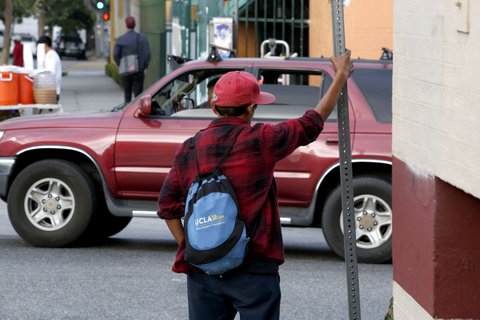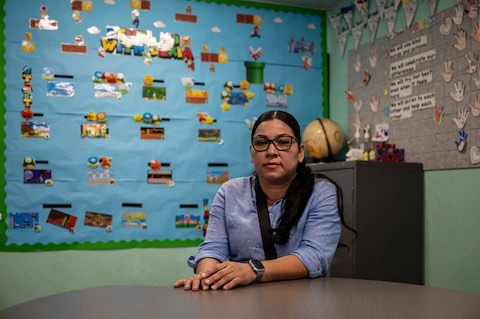
21 Mar Day Laborer Centers Close Nationwide Due To Coronavirus

Above: Day laborer centers have closed due to the shortage of employers and an effort to stop the spread of the coronavirus. Photo by Aurelia Ventura / La Opinión
By Araceli Martinez Ortega, La Opinión
The coronavirus pandemic has forced the closure of all day laborer centers throughout the country, including about 20 centers in California, putting thousands of people out of work.
“We did it to protect workers, the community and employers. It is not good that 50 labor workers are together in a center waiting for a job,” said Pablo Alvarado, director of the National Day Laborer Organizing Network (NDLON).
Amid the pandemic, in the first two weeks of March, employers stopped showing up at the centers.
“In recent days, it was very rare that someone came looking for workers,” he said.
“A day laborer center is the first place where a crisis is felt. Those who hire workers usually are people who have a surplus of money. Fifty percent are homeowners, 43% contractors or subcontractors and 7%, restaurant owners. Employers no longer have that extra money, they become more protective of their income, and they no longer hire workers.”
Los Angeles alone has ten day labor centers, plus dozens of other corners where workers congregate on their own seeking day jobs. The National Day Laborer Network estimates that there are 35,000 day labor workers in Los Angeles.
María Zamorano, a 50-year-old day laborer in Los Angeles, has two overwhelming fears: loss of work and contracting the coronavirus. All of her cleaning jobs have been canceled as people shelter-in-place.
“I’m very well-known because I do a good job, but none of that matters now. I have lost my job, and I am asking God to stop this pandemic as soon as possible,” Zamorano said.
Zamorano said she had been making a good living as house cleaner for her clients at the Pasadena Community Job Center, a day laborer center.
“Through my job as a labor worker, I was able to support my three children as a single mother. Now that they are adults, I work to support myself, pay my rent, my car and send money to my parents and a daughter who became a widow in Mexico,” she said.
She has been a day laborer 14 years and now has been without work for 13 days.
“I’ve gotten some construction work and deep cleaning jobs in places not very hygienic, and who knows if it is contaminated with the coronavirus, but we have to do what we can to survive,” she said.
In California, as of March 18, the Department of Public Health has reported 675 positive cases and 16 deaths from the coronavirus.
A real crisis for day laborers
Most of the 70 centers for day laborers in the country have been closed since last week as a preventive measure against the virus.
Thousands of other laborers who congregate in corners throughout California cities in their search of daily work may still be at risk.
“We have 700 day labor corners in 22 states of the country. There is no control on the streets. These workers do not have any help, and it is a great concern that employers can take them to sterilize homes and public places with no protections,” Alvarado said.
In the Los Angeles metropolitan area, there are 125 corners where day laborers gather as soon as daylight rises and wait for employers.
Pretending to be younger
Among the measures ordered by California Governor Gavin Newsom to stop the pandemic from spreading was a directive enacted on Sunday for people 65 or older to isolate themselves at home.
But the need to work is so great that many day laborers began to pretend to be younger, Alvarado said. “They started to tell us, ‘What do you want us to do? If we don’t look for a job, who is going to feed us.’ ”
The day laborers’ ages range from 18 to 75 years.
Alvarado said that the anguish is twofold because they have been left without a job and possibly exposed to the disease.
“If someone gets the virus, they should know that even they are undocumented, they can ask for help. They should call us and we will guide them to obtain the health services they need,” he said.
Virtual job centers
The last day laborer center to close in Los Angeles County was the Pasadena Job Community Center.
“We have designed a virtual system for employers to apply for workers online or by phone,” said Manuel Vicente, head of the Pasadena Day Laborer Center.
“We also established a filter to assure the employer that the day laborer who goes with them to work is healthy,” he said.
In addition, the center has given day laborers protective equipment with masks, gloves, glasses and antibacterial gel.
However, this option has not calmed the fears of the day laborers. “If they can’t work, how are they going to pay the rent for their home and cover other essential expenses,” said worker Manuel Vicente.
The goal of the National Day Laborers Network is for all day labor centers to become virtual employment centers for the duration of the coronavirus crisis.
“If they have computers, internet and a phone they can do it,” Alvarado said.
Help with rent and food
The Pasadena Day Laborer Center also will be a collection center for food, such as beans, corn, rice and oil to give to workers.
“We are going to create a social protection network by establishing a donation fund that allows us to help day laborers with the rent for their home, services and other expenses because the bills do not wait, and we do not want them to be condemned to suffer,” said Alvarado.
Most day laborers are undocumented immigrants, without access to paid sick days. They are unable to work from home, have no access to health care, no financial security and live day-to- day.
If you want to donate to help the thousands of day labor workers who are among the population most at risk of contracting the coronavirus, visit the fund of the Migrant Worker Safety Network: https://secure.actblue.com/donate/immigrantworkersafetynetfund?link_id=1&can_id=cf36c03ca344598cafea4dbaa9d1f3a9&source=email-firstname-default-friend-help-us-launch-an-immigrant-worker-safety-fund&email_referrer=email_754432&email_subject=firstname-default-friend-help-us-launch-an-immigrant-worker-safety-net-fund
Araceli Martinez Ortega is a reporter with La Opinión in Los Angeles. This article is part of The California Divide, a collaboration among newsrooms examining income inequity and economic survival in California.






No Comments